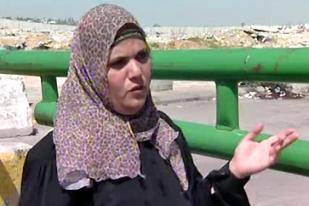ID cards split Palestinian families
Israeli residency law prevents Palestinians from travelling between Jerusalem and Gaza.

 |
| Camilia has not seen her family for seven years, after her ID card was seized |
From the moment I set foot in Gaza there was one question everyone kept asking me: “When are they going to open the crossings?”
For almost a year now the two points at which people can get out of Gaza – the Erez and Rafah crossings – have been closed to all Palestinians.
Even the Hamas forces guarding the crossings were asking me the same question. They are all prisoners in Gaza.
But there is a larger problem beyond the closed crossings, one that will last long after deals on opening Rafah and Erez are made – Israel is using a controversial residency law to prevent Palestinian holders of Jerusalem identity cards currently living or even visiting Gaza from going back to their city.
Israel unilaterally annexed Arab East Jerusalem in 1967, declaring its unification with predominantly Jewish West Jerusalem into what it called “the eternal capital of Israel”.
But the move has never gained international recognition as East Jerusalem is considered part of the occupied West Bank.
Israel’s main goal has been to reduce the number of Arabs in Jerusalem so that, in the event of a deal to end the Israeli-Palestinian conflict, Israel will be able to claim the city as its own without fear of a major challenge.
Population challenge
Palestinian Arabs have a higher rate of population growth than Israeli Jews, given that about 313,000 Jews have left Jerusalem over the last 25 years.
As only 208,000 Jews moved to the city in the same period, Israel has adopted a series of measures to lay claim to Jerusalem.
They include the physical isolation of East Jerusalem from the rest of the West Bank, continued expropriation of land, discrimination in services provided to East Jerusalem and the revoking of residencies and social benefits of Palestinians who study or live abroad.
The story is not new, but has taken a bizarre turn after Israeli troops unilterally “disengaged” from the Gaza Strip in 2005.
 |
| Israel has maintained a strict security policy on Gaza despite pulling out in 2005 [Reuters] |
Israel started treating Gaza, which remains effectively (and according to international law) under Israeli occupation, as a de facto “outside entity”.
The awkward definition provided Israel with an opportunity to expand its long-standing policy of reducing the number of Palestinian residents in East Jerusalem by either revoking the ID cards of those who reside “abroad” or by barring their return.
Suddenly, Palestinian Jerusalemites and West Bankers, who reside in Gaza for reasons of marriage or work, were treated by Israel as residing “abroad” – a de facto classification that serves Israel’s declared goal of changing the demographics of the old city of East Jerusalem.
All Palestinians hold ID cards that essentially dictate where they can live, work and move.
There are three types of ID Cards one can hold – West Bank, Gaza and Jerusalem (or Israeli as some call it). The three areas are Palestinian territories that continue to be under illegal Israeli occupation.
Officially, the Palestinian Authority (PA) has the right to issue West Bank and Gaza IDs, while Israel issues the Jerusalem IDs.
In practice it is the Israelis who control all three lists, with the PA simply administering the procedure – the PA has no actual power to issue or take away ID cards.
It is Israel that decides who is, and who is not, a West Banker, Gazan or Jerusalemite.
‘Quiet Deportation’
This means many Palestinians live in one place and have families in another that they are completely cut off from.
Between December 1995 and March 1999, Israel started to revoke residencies from all those who moved outside Jerusalem’s municipal boundaries.
Those who could not prove (by providing numerous documents) that their so-called “centre of life” was in Jerusalem lost their cards and had to leave their homes forever.
They could not work or live in Israel or East Jerusalem and their families lost all their social benefits.
 |
| Many Palestinian women have been separated from their husbands due to the ID card policy |
The Israeli authorities neither announced the policy nor warned Palestinians that by living outside Jerusalem they would lose their status and right to return.
Previously, as long as Palestinians returned to renew their permits, they were allowed to remain Jerusalemites.
But after the changes in 1995 the permanent residency of 3,000 individuals “expired” almost overnight.
Although the policy of ‘quiet deportation’ was ceased by Israel’s interior minister in March 2000, the practice effectively continues.
In 2006 (the latest figures available from the ministry of the interior), 1,363 Palestinians had their residencies revoked.
And revoked did not just mean they cannot live there. It also means they cannot even enter the area without special permission from the Israelis.
In this way Israel controls not just the flow of people and the physical split of the Palestinian territories, but also the demographics.
By taking away Jerusalem IDs and swapping them for Gazan ones, they keep Palestinians in the disputed Jerusalem area in check.
Also, Jerusalemites that marry Palestinians with a Gaza or West Bank ID can be stripped of their Jerusalem residencies, according to Israeli law.
The policy does not just effect who Palestinians marry, it also splits families and deprives people of their basic right to a birthplace that they can live in as well as social benefits.
No Way Out
I met Camilia on my last day in Gaza.
She was with a group of women who had either West Bank IDs and could not leave Gaza or, like her, Jerusalem IDs that had been taken away.
Camilia was born in occupied East Jerusalem and grew up there. Twenty years ago she moved to Gaza to marry a Gazan and have children.
She used to visit her parents in Jerusalem frequently but her ID was taken away seven years ago while she was in Jerusalem.
She was given a photocopy of it, on which the Israeli authorities wrote: “Please let me into Gaza.”
They told her to take it to the crossing and said she would be let into Gaza. They never explained why her residency was being revoked nor what that would effectively mean.
She told me that she got to the Erez crossing and her parents stayed in the car while she talked to the border police.
They told her she could either enter Gaza and not be able to leave, or she could go back to Jerusalem with her parents but then not be able to see her husband and children.
She chose her husband and family and has not seen her parents since.
Months later, they gave her a Gazan ID card; in her words, a “useless piece of paper that doesn’t allow you to leave Gaza”.
She says it is another way in which the Israelis punish Palestinians.
The Jerusalem ID is the most precious of the cards, according to many of the Palestinians I met.
With it, one can get social benefits and live and work in occupied east Jerusalem and across Israel, where wages are higher and employment is much easier to find.
Without it, one lives under a crippling siege in Gaza, with no way out.
Al Jazeera is not responsible for the content of external websites